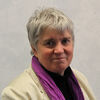
Jo Guiver
- Course: PhD in Transport Studies
- PhD title: Understanding the Conceptual Models used in Transport Planning and Mode Choice: A Case Study
- Year of graduation: 2003
- Nationality: British
- Job title: Researcher Lecturer
- Company: University of Central Lancashire, Institute of Transport and Tourism
Now I am a researcher and lecturer in the Institute of Transport and Tourism at the University of Central Lancashire. I investigate all sorts of subjects related to transport and tourism. I love the varied work, for example last year I launched an on-line survey for people stranded by the Volcanic Ash Cloud and did a survey of people in Workington, West Cumbria about how they travelled in the months after all their road bridges were damaged or destroyed in the floods of November 2009. I’ve led studies into cycling, bus travel, heritage rail travel, day visitor itineraries and much more. My research work involves designing the project, managing the fieldwork, analysing the data, writing the reports, presenting the results and writing papers. The fun bit is going to European conferences, as our Institute tries to practice sustainability by not flying. I enjoy meeting researchers from different countries and finding links between our work. The hard bit is writing reports and papers, but there is a sense of satisfaction when you see them in print.
I teach sustainable travel, travel and tourism and research methods. At the moment I tend to do guest appearances in other people’s modules. I always get a buzz when a student chooses to do an assignment based on one of my lectures. I am hoping to involve more undergraduate students in research, so they develop the necessary craft skills.
My job requires a PhD related to transport or tourism, so a PhD from the most prestigious transport institute in the country was obviously useful for getting it. I find the thorough grounding in research methods invaluable, and although I am more of a qualitative researcher by choice, most of our projects involve some quantitative methods and I am grateful that I feel competent in these and understand their philosophical bases.
All the reading I did during my time at ITS has proved useful time and time again, both for my own literature reviews and for helping my own PhD students. Our room in ITS hosted some great discussions and I still keep in touch with many fellow students.
I knew ITS was the best place to do a transport PhD. After my Master’s I e-mailed to find out how to do a PhD and they told me there was a paid studentship, but I would have to decide before 30th September. That was on the 28th of September! I took a train to Leeds that day and signed up immediately. My advice to students interested in this course would be that taking a PhD is a big undertaking, but if you want to do one in transport studies the best place for resources, knowledgeable staff, a brilliant research culture is ITS.

